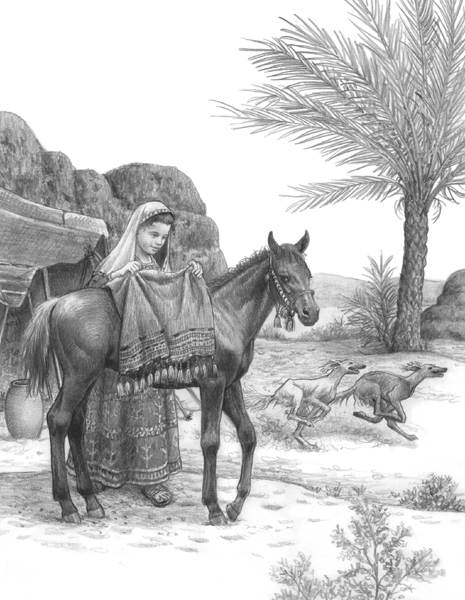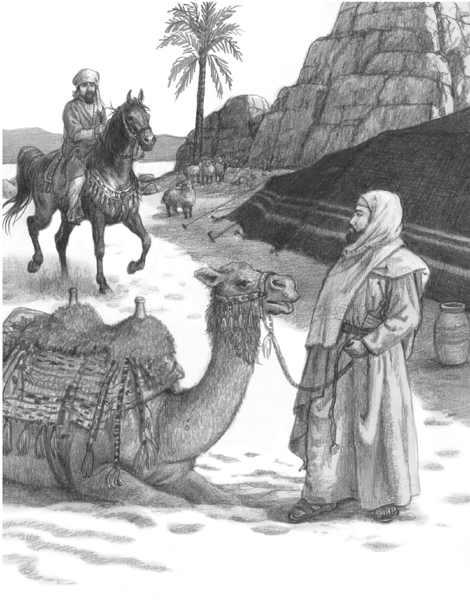

I spun around, whinnying anxiously for Jumanah and the rest of the herd. There was a flash of silvery mane, and I saw a moon-gray mare I didn’t recognize. A human clung to her back; as I watched, he leaned over and grabbed a lamb off the ground. For a moment, he stared directly at me, his face calculating. But then he turned away and let out a shout.
“Away!” he cried out. “They’re awake!”
The silvery mare whirled and raced off as swiftly as the desert wind itself, the lamb bleating piteously from her back. I blinked into the darkness, able to spy only vague shapes disappearing into the night.
That was when Jumanah found me. Are you all right, little one? she wanted to know as she nosed me from head to toe.
What has happened? I asked her, my heart still beating fast from the commotion.
It was a raid, she told me. Just as our humans raided another camp to bring us Hasna, so have these other humans raided us in turn. They probably saw that we were travelers and not ready to defend ourselves.
I soon discovered that she was right. The raiders had spotted us from a distance as we’d passed through their territory earlier that day. They had come to us under the cover of darkness and escaped with one of our camels, half a dozen sheep … and Tawil.
When I noticed that the colt was among the animals taken, I refused to accept it at first. I raced around the temporary camp, calling for him while searching among the goats and beneath the camels for his familiar chestnut form. But he was nowhere to be found, and soon I realized there was no point in such efforts. His absence saddened me, though most of the humans seemed far more upset about the loss of the camel.
“At least they didn’t get any of the mares,” one man said. “Allah be praised it was only the colt who was taken.”
“Yes,” Basim responded. “Poor Jumanah will be better off for having one fewer mouth to feed.”
“Indeed.” Nasr turned to stare at me thoughtfully by the light of the fire. “I suppose it’s a blessing that it was the colt and not the filly.”
Drawn by his gaze, I walked toward him and nosed at his robes. He dropped one hand briefly onto my withers before abruptly turning and hurrying away.
Two days later, we finally reached the new oasis. It was even larger and more pleasant than the one we’d left, with a waterfall tumbling down a rocky cliff and plenty of grass coating the banks of the large spring. Other humans were already there, and they let out cries of joy when they spotted us approaching. These were Nasr’s cousins, who had gone their own way during the driest months. They hurried to help our humans set up their tent, while all the animals got acquainted with the other group’s herds and then chose their favorite spots to eat and rest.
We horses found ourselves in the company of Cousin Rami’s horses, which numbered four mares, along with a yearling filly and an adult stallion known as Majeeb. These horses recognized all except Hasna and me from the last time the families had camped together, so it didn’t take long until we were all one large, happy herd. Once a month or two had passed, it was as if we’d never lived anywhere else.
The grazing helped me grow taller and stronger. My foal fuzz was gone by now, replaced by a sleek coat of glossy black. Eventually Jumanah began turning away when I tried to nurse, and after a while, I didn’t even miss her milk. The fresh grass and the cool springwater were all I needed, though Safiya often brought me dates and other little treats.
Sometimes Safiya would clench both fists and hold them out to me, wanting me to guess which one held my treat. It was easy for me to locate the date or other morsel by smell, though it seemed to delight the girl no end when I would nose at the correct hand. Sometimes, too, she would want me to perform some little task or movement before I got my treat. Once I picked up the foot she grasped, or bowed my head, or allowed her to drape a cloth on my back, she would feed me the treat and then scratch and praise me with great enthusiasm. Her happy words at these times were of nearly the same value to me as the food itself, for I enjoyed pleasing her.

One day, when we were playing these games, I noticed Nasr watching us from over near the tents. His face wore a thoughtful expression.
I pricked my ears toward him. Safiya turned to see what I was looking at and spotted him as well.
“Look, Father!” she called. “See how fast Yatimah learns things? She is the smartest filly I’ve known!”
“Hmm” was all Nasr said in response. Then he turned to shoo one of the dogs away from the tents.
During this time, Nasr started to ride Jumanah. She always did her best to please him, and the more he rode her the stronger she became. One day, they returned from a ride while Safiya was picking knots out of my tail, which had become tangled during my last vigorous roll in the sand.
“How is Jumanah doing, Father?” she asked.
“As well as can be expected.” Nasr patted the gray mare, then swung down from the saddle. “I only wish she were faster.” He sighed, sounding dissatisfied.
“I’m sure she goes as fast as she can,” Safiya said. “She is of heavier build than Sarab was, after all.”
At that moment, one of the dogs barked, and I saw the sheep start to run around in circles, bleating with panic. I spun to face them, my muscles quivering as I wondered whether I should race over and join them. It was only the sheep being silly, so I stayed where I was, but Nasr looked at me with a frown.
“At least Jumanah has a good, steady temperament,” he muttered, giving the mare another pat as she stood quietly by his side. “That is a blessing from Allah.”
The next two or three years passed in much the same way. We horses have little concept of time, and I soon lost track of how often we moved to a new oasis. Sometimes we joined camps with other humans from Nasr’s family, and at other times it was just us. Often the humans would trade among themselves or with passing travelers, which meant the herds of sheep and goats were always changing, and often some of the puppies would go off to a new home when they were old enough. During the second season that we camped with Rami’s clan, we found that he had taken two new mares in a raid and had traded one of his camels for a young stallion that both he and Nasr would be able to use for breeding.
But our own little herd of horses remained the same, so I didn’t worry much about any of that. Moving every so often began to feel as natural a part of life as eating and sleeping.
I had grown into a strong, graceful mare, sound of limb and wind. When I was old enough, Basim began my training. Thanks to the little games Safiya had taught me, it was easy for me to understand what he wanted most of the time. Before long he was riding me around our current oasis home and out for short distances into the desert, and he seemed well pleased by my progress.
One day, as we returned from such a desert ride, my pace quickened. I had caught the scent of something new—a camel, but not one of ours. What was a strange camel doing in our oasis? I guessed right away that it had to be a traveler, perhaps part of a caravan passing through.
“What is it, Yatimah?” Basim asked, giving me a pat.
I could not answer him except by pricking my ears toward the strange scent. A moment later, he could see the unfamiliar camel for himself. It was lowering itself onto the sand near the tent, looking sandblown and weary. A man slid down from its back as we approached. I was surprised to see that he and his camel were alone, for in the desert, most humans travel in groups for safety.

Then I caught the traveler’s scent and saw his face, which looked as weary as his camel’s. I let out a trumpet of alarm, for I had a good memory. Though I did not know the camel, I recognized this man.
It was the stranger who had ridden into our temporary camp in the desert some years back aboard a pale gray mare—one of the raiders who had taken Tawil and the other animals!